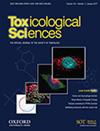单细胞转录组学揭示了早期 BDE-99 暴露对肠道-肝脏轴的重编程作用,从而促进雄性小鼠成年晚期的促炎症代谢特征
IF 3.4
3区 医学
Q2 TOXICOLOGY
引用次数: 0
摘要
多溴联苯醚(PBDEs)是一种可在环境中进行生物累积的传统阻燃剂。肠道微生物组是肝脏功能的重要调节因子,包括异生物的生物转化和免疫调节。我们最近的研究表明,新生儿暴露于多溴联苯醚-99(BDE-99)(一种富含母乳的多溴联苯醚同系物)会上调促炎症基因,下调药物代谢相关基因,这主要发生在男性成年期。然而,这种失调是否会持续到成年晚期、对肝细胞类型的不同影响以及新生儿 BDE-99 暴露对肠道微生物组的影响仍是未知数。为了填补这些知识空白,雄性 C57BL/6 小鼠从出生后第 2-4 天开始每天一次口服玉米油(10 毫升/千克)或 BDE-99(57 毫克/千克)。在幼鼠 15 个月大时,新生儿 BDE-99 暴露会下调肝细胞中的异生物和脂质代谢酶,并上调涉及微生物流入的基因。新生儿 BDE-99 暴露还增加了肝脏中性粒细胞的比例,并导致巨噬细胞迁移抑制因子信号的预测增加。这与肠道紧密连接蛋白(Tjp)转录本的减少、肠道环境的改变以及炎症相关代谢物的失调有关。利用无菌(GF)小鼠进行的 ScRNA 序列分析表明,正常的肠道微生物群对维持肝脏免疫耐受是必不可少的。使用来自新生儿期暴露于 BDE-99 的成人大肠微生物组移植到 GF 小鼠体内的微生物组下调了 Tjp 转录本,并上调了大肠中的几种细胞因子。总之,新生儿BDE-99暴露重编程了肝脏中细胞类型特异性基因的表达和交流,使其趋向于促炎,而BDE-99介导的促炎特征可能部分是由于肠道环境失调造成的。本文章由计算机程序翻译,如有差异,请以英文原文为准。
Single cell transcriptomics unveiled that early life BDE-99 exposure reprogrammed the gut-liver axis to promote a pro-inflammatory metabolic signature in male mice at late adulthood
Polybrominated diphenyl ethers (PBDEs) are legacy flame retardants that bioaccumulate in the environment. The gut microbiome is an important regulator of liver functions including xenobiotic biotransformation and immune regulation. We recently showed that neonatal exposure to polybrominated diphenyl ether-99 (BDE-99), a human breast milk-enriched PBDE congener, up-regulated pro-inflammation- and down-regulated drug metabolism-related genes predominantly in males in young adulthood. However, the persistence of dysregulation into late adulthood, differential impact of hepatic cell types, and the involvement of the gut microbiome from neonatal BDE-99 exposure remains unknown. To address these knowledge gaps, male C57BL/6 mouse pups were orally exposed to corn oil (10 ml/kg) or BDE-99 (57 mg/kg) once daily from postnatal days 2-4. At 15 months of age, neonatal BDE-99 exposure down-regulated xenobiotic and lipid metabolizing enzymes and up-regulated genes involved in microbial influx in hepatocytes. Neonatal BDE-99 exposure also increased the hepatic proportion of neutrophils and led to a predicted increase of macrophage migration inhibitory factor signaling. This was associated with decreased intestinal tight junction protein (Tjp) transcripts, altered gut environment, and dysregulation of inflammation-related metabolites. ScRNA-seq using germ-free (GF) mice demonstrated the necessity of a normal gut microbiome in maintaining hepatic immune tolerance. Microbiota transplant to GF mice using large intestinal microbiome from adults neonatally exposed to BDE-99 down-regulated Tjp transcripts and up-regulated several cytokines in the large intestine. In conclusion, neonatal BDE-99 exposure reprogrammed cell type-specific gene expression and communication in liver towards pro-inflammation, and BDE-99-mediated pro-inflammatory signatures may be partly due to the dysregulated gut environment.
求助全文
通过发布文献求助,成功后即可免费获取论文全文。
去求助
来源期刊

Toxicological Sciences
医学-毒理学
CiteScore
7.70
自引率
7.90%
发文量
118
审稿时长
1.5 months
期刊介绍:
The mission of Toxicological Sciences, the official journal of the Society of Toxicology, is to publish a broad spectrum of impactful research in the field of toxicology.
The primary focus of Toxicological Sciences is on original research articles. The journal also provides expert insight via contemporary and systematic reviews, as well as forum articles and editorial content that addresses important topics in the field.
The scope of Toxicological Sciences is focused on a broad spectrum of impactful toxicological research that will advance the multidisciplinary field of toxicology ranging from basic research to model development and application, and decision making. Submissions will include diverse technologies and approaches including, but not limited to: bioinformatics and computational biology, biochemistry, exposure science, histopathology, mass spectrometry, molecular biology, population-based sciences, tissue and cell-based systems, and whole-animal studies. Integrative approaches that combine realistic exposure scenarios with impactful analyses that move the field forward are encouraged.
 求助内容:
求助内容: 应助结果提醒方式:
应助结果提醒方式:


